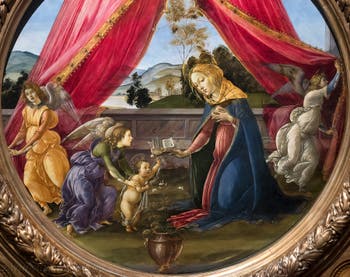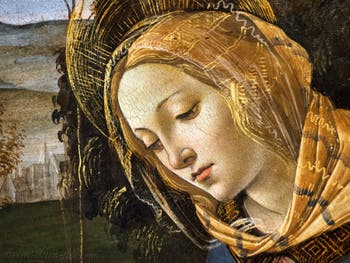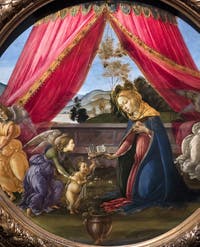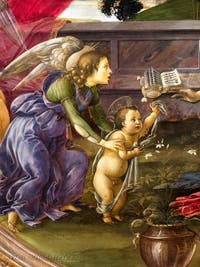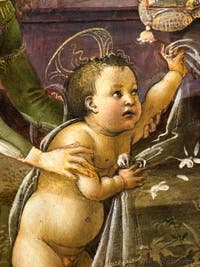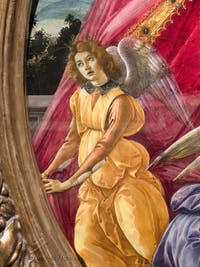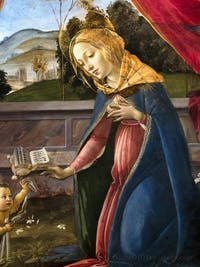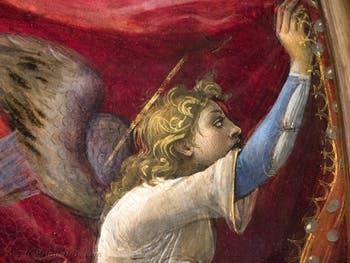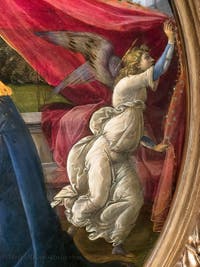Museums Ambrosiana | Castello Sforzesco | Poldi Pezzoli
Ambrosiana Artists | Location | Opening Hours Tickets | Authorizations
Artists Leonardo da Vinci | Botticelli | Raphael | Caravaggio | Titian | Luini | Bassano | Bramantino | Lucretia Borgia | Piazza | Pinturicchio | Tiepolo | Veronese B. | Vivarini
Botticelli “The Madonna of the Pavilion” at Ambrosiana Gallery Pinacoteca in Milan Italy
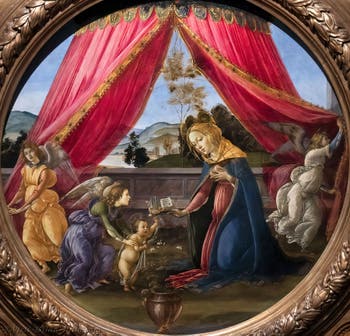
Virgin of the Pavilion
Sandro Botticelli (March 1, 1445 - May 17, 1510) “The Virgin of the Pavilion”
Painting - Tempera on Wood (65 x 65 cm) 1495-1500This painting by Botticelli depicting the Madonna with the Child and Three Angels, also called “Madonna in the Pavilion” in reference to the canopy, was commented on by Giorgio Vasari as follows:
“Of great beauty, a small tondo in his hand that had been seen in the room of the Prior of the Angeli in Florence, with small figures full of grace, and executed with admirable care and reflection.”
Giorgio Vasari - Lives of Artists 1550
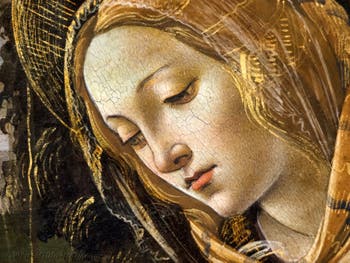
Virgin of the Pavilion It was the prior of the Camaldoli Monastery of Santa Maria degli Angioli, which was located in Via dei Alfani in Florence.
The works of art it contained were dispersed after it was closed in 1808.
This is why this painting by Botticelli ended up in the Pinacoteca Ambrosiana in Milan.
The scene takes place in a terraced garden of a villa as seen on the heights of Florence along the Arno River.
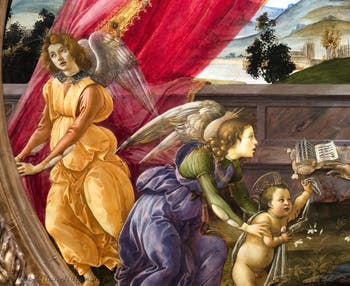
Virgin of the Pavilion The Madonna kneels before the Infant Jesus under a canopy with superb scarlet red draperies whose sides are held open by two angels.
The third angel helps Child Jesus to stand in front of his mother as they reach out to each other in a scene of life full of grace and gentleness.
The Madonna presses her breast to make her milk flow in the direction of her Child in the manner of some Roman nude Venus sculptures.
This is not the melancholic Madonna with a pensive face as in Botticelli's previous paintings, but simply a pious woman embodying the tenderness of maternal love.
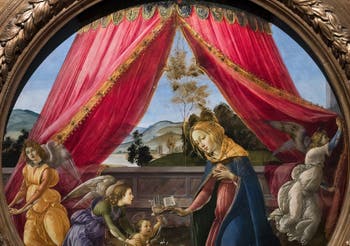
Virgin of the Pavilion Botticelli highlights the natural relationship of a mother breastfeeding her Child through the breast that she presses to make her milk come out.
A mother more “virginal” than in her other paintings, closer to the Christian ideal of the Virgin.
It will be noted that a single angel shows his care and closeness by helping the Child Jesus to stand while looking at the Madonna.
The two angels who open the draperies of the canopy (or the pavilion) have their faces turned towards the outside of the painting and do not look at the central scene.
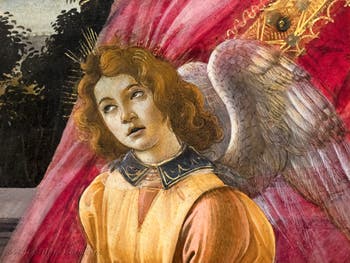
Virgin of the Pavilion Between these open draperies, you can see the low marble wall that encloses the garden.
The Virgin Mary interrupted her reading and left her book of hours open on a cushion placed on the stone bench that is an integral part of this wall.
Behind the wall, you can see a peaceful landscape similar to the gentle hills that can be seen along the Arno River.
A vase containing lilies is at the forefront of this touching scene.
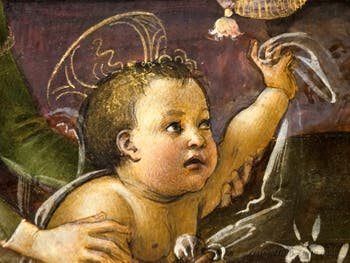
Virgin of the Pavilion The elegance and lightness of the drapes in this Botticelli painting are commensurate with the magnificent illustrations of Dante's Divine Comedy that he made at the same time.
The draperies with their folds have the trembling flight that we find in the illustrative drawings of the Divine Comedy.
The serene beauty of the angels' faces is also remarkable: ethereal, airy angels whose garments seem swollen by an inner breath.
The colours in the painting are both unique and beautiful.
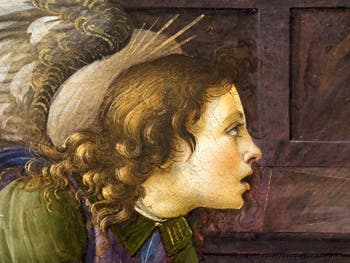
Virgin of the Pavilion Thus, the deep azure blue of the mantle of the Madonna is worn over a purple dress.
The angel who supports the Child is dressed in a mauve dress in perfect harmony with the pale and, at the same time, deep green of his shirt.
The angel on the left of the painting is wearing a saffron-coloured dress with pale red sleeves, again in perfect harmony with the hanging of the pavilion in front of which he is located.
While the angel on the right is dressed in white with delicate blue sleeves.
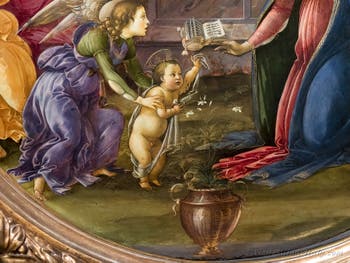
Virgin of the Pavilion Finally, the scarlet curtains of the canopy, topped with foliage and pearls embroidered with gold, are simply sumptuous.
This curtains opening is reminiscent of Giotto's paintings, where angels hold the pavilion sections.
Botticelli beautifully rendered and transformed a pavilion who gave its name to this beautiful work, the so-called “Madonna in the Pavilion”, exhibited at the Pinacoteca Ambrosiana in Milan.
Artists Leonardo da Vinci | Botticelli | Raphael | Caravaggio | Titian | Luini | Bassano | Bramantino | Lucretia Borgia | Piazza | Pinturicchio | Tiepolo | Veronese B. | Vivarini
Ambrosiana Artists | Location | Opening Hours Tickets | Authorizations
Museums Ambrosiana | Castello Sforzesco | Poldi Pezzoli
Back to Top of Page


